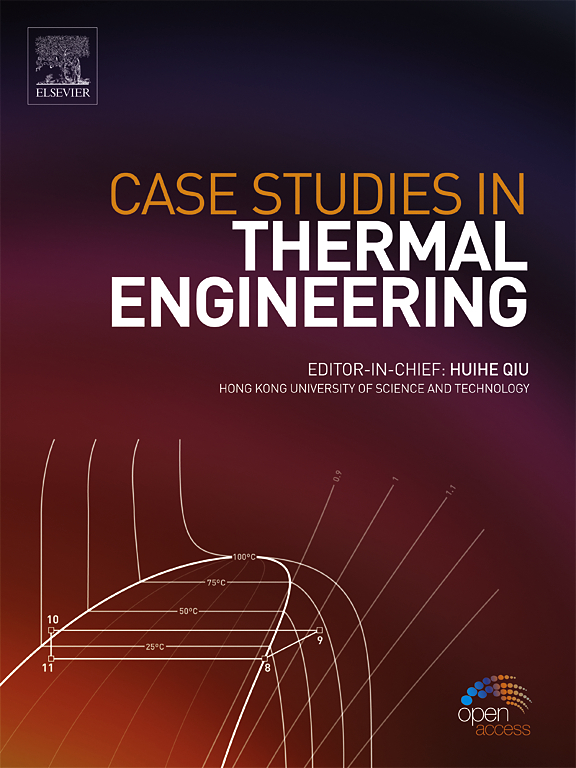楔形动脉上磁化三混合纳米流体的纳米级热传输分析:凯勒盒与有限元方案的结合
IF 6.4
2区 工程技术
Q1 THERMODYNAMICS
引用次数: 0
摘要
这项研究标志着磁化三元混合纳米流体的设计和应用向前迈出了关键一步,为热管理和医疗技术的创新铺平了道路。本文对含有 SiO2、TiO2 和 Al2O3 纳米粒子的磁化三元混合生物纳米流体在三维楔形几何体上的纳米级热传输进行了优化分析。通过热效应和焦耳热效应研究了热传输分析,并选择了三元混合成分以充分利用纳米粒子的综合热特性。此外,还研究了不同物理参数下流动模式的详细流线。物理系统由偏微分方程(PDE)系统构成,并通过相似性转换将其转换为常微分方程(ODE)系统。温度随压力梯度、剪切应变和热辐射参数的增加而增加。阻力的大小随着魏森堡数的增加而增大。当 We = 0.2、0.3、0.4、0.5、0.6 时,三元纳米流体的表皮摩擦力分别增加了 13%、17%、21%、23% 和 26%。当 β = 0.3、0.4、0.5、0.6、0.7 时,三元纳米流体的皮肤摩擦力分别降低 30%、25%、20%、15% 和 10%。本文章由计算机程序翻译,如有差异,请以英文原文为准。
Nanoscale heat transport analysis of magnetized trihybrid nanofluid over wedge artery: Keller box and finite element scheme combination
This research represents a crucial step forward in the design and application of magnetized ternary hybrid nanofluids, paving the way for innovations in thermal management and medical treatment technologies. Optimization analysis of nanoscale heat transport for magnetized ternary hybrid bio nanofluid containing SiO2, TiO2, and Al2O3 nanoparticles over a three-dimensional wedge geometry is made in this article. Heat transport analysis is studied through thermal and joule heating effects and the ternary hybrid composition is chosen to leverage the combined thermal properties of the nanoparticles. Furthermore, detail streamlines of flow pattern are investigated for different physical parameters. Physical system is formulated with the system of Partial differential equation (PDEs) and it is processed with similarity transformation to convert it into system of ordinary differential equation (ODEs). Furthermore, Keller box scheme is applied to fetch its numerical solution and compared with finite element technique for validation and found smooth agreement.
Temperature is increased with pressure gradient, shear strain and thermal radiation parameter. Magnitude of drag force is increasing with increasing Weissenberg number. For We = 0.2, 0.3, 0.4, 0.5, 0.6, skin friction increases in ternary nanofluid with 13 %,17 %, 21 %, 23 % and 26 % respectively. For β = 0.3, 0.4, 0.5, 0.6, 0.7, skin friction decreases in ternary nanofluid with 30 %,25 %, 20 %, 15 % and 10 % respectively.
求助全文
通过发布文献求助,成功后即可免费获取论文全文。
去求助
来源期刊

Case Studies in Thermal Engineering
Chemical Engineering-Fluid Flow and Transfer Processes
CiteScore
8.60
自引率
11.80%
发文量
812
审稿时长
76 days
期刊介绍:
Case Studies in Thermal Engineering provides a forum for the rapid publication of short, structured Case Studies in Thermal Engineering and related Short Communications. It provides an essential compendium of case studies for researchers and practitioners in the field of thermal engineering and others who are interested in aspects of thermal engineering cases that could affect other engineering processes. The journal not only publishes new and novel case studies, but also provides a forum for the publication of high quality descriptions of classic thermal engineering problems. The scope of the journal includes case studies of thermal engineering problems in components, devices and systems using existing experimental and numerical techniques in the areas of mechanical, aerospace, chemical, medical, thermal management for electronics, heat exchangers, regeneration, solar thermal energy, thermal storage, building energy conservation, and power generation. Case studies of thermal problems in other areas will also be considered.
 求助内容:
求助内容: 应助结果提醒方式:
应助结果提醒方式:


